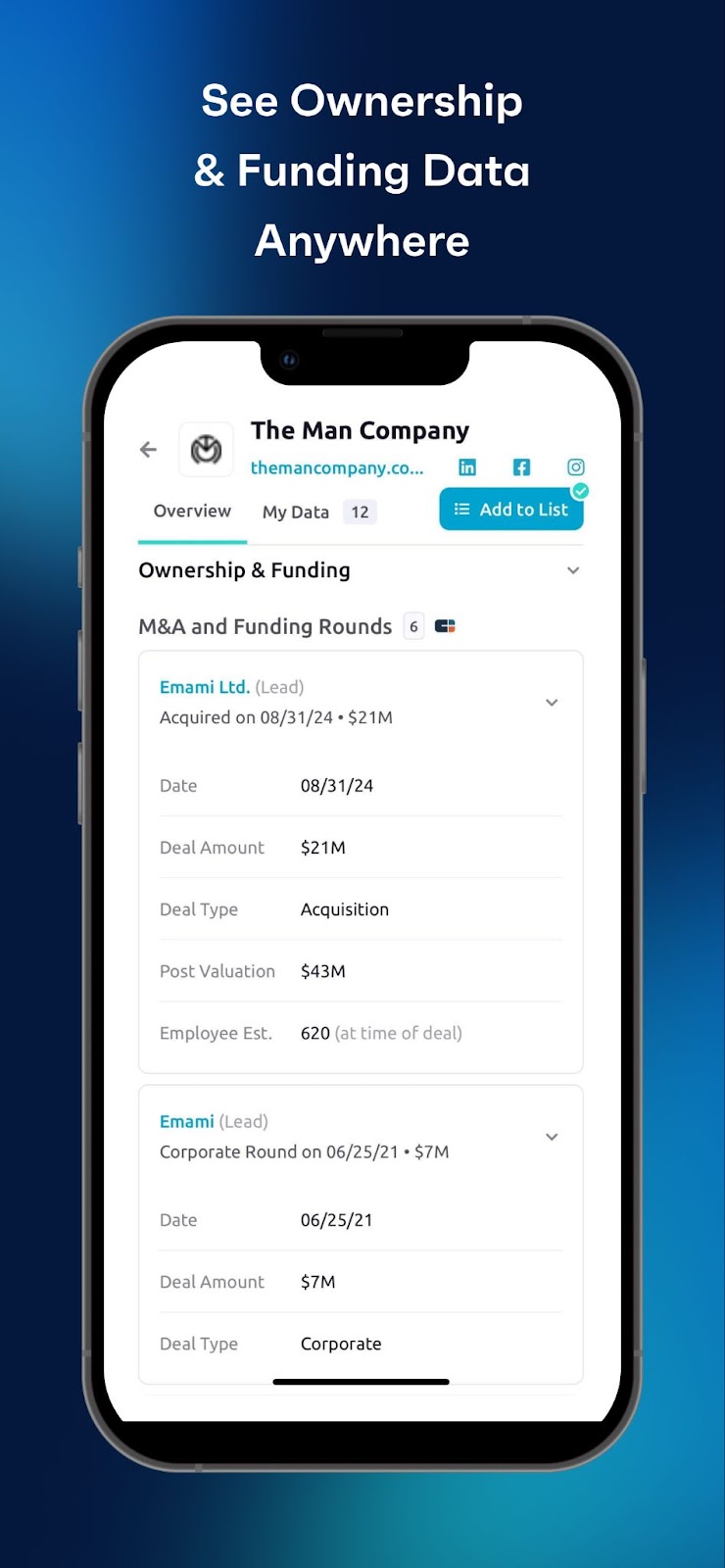The lipstick effect is the theory that consumers more frequently splurge on smaller luxuries — like lipstick and other beauty products — during economic downturns as a way to keep their spirits up. (Retail therapy, anyone?)
But 2025 seems poised to put that theory to the test. While the global beauty market is expected to grow to $677B this year, revenue growth has notably slowed. Amid rising inflation and chaotic economic uncertainty, consumers are increasingly turning to cheaper products or cutting back on beauty purchases altogether. Estée Lauder Companies, Shiseido, and Coty — three of the largest beauty conglomerates in the world — all reported declines in Q4’24 sales.
Still, the beauty & aesthetics industry has much to offer private market investors. Manufacturers of beauty products and aesthetic devices, in particular, could provide lucrative opportunities for dealmakers.
In this PE Playbook, the Grata team has put together the need-to-know trends for investors considering making moves in the beauty and aesthetics industry, including:
- How the space is fragmented
- Which markets are seeing revenue growth
- Recent acquisitions in the industry

The market map above is not intended to be an exhaustive representation of companies in the space.
Companies that provide services that fall into multiple segments are categorized in this report by their primary offering.
Industry Overview
Market Distribution
Geography

Naturally, the greatest concentrations of beauty & aesthetics companies can be found in states with the highest population density and average income levels, i.e., California, Texas, New York, and Florida. Consumers in these states tend to have more disposable income to spend on cosmetic products or trips to the med spa.
But opportunities in the space are widespread. Colorado, New Jersey, Virginia, and Oregon are among the states with the highest internet searches for beauty products, including skincare, haircare, and makeup. These states are also in the top 20 states for per capita personal income.
Dealmakers should also take into consideration the growing rate of beauty sales through e-commerce. Businesses with strong online presences could attract customers outside of their home state, leading to higher revenue potential.
Ownership

Even with heavy-hitting, longstanding brands in the mix, the beauty & aesthetics industry is highly fragmented. Privately-owned businesses and their subsidiaries account for a solid 40% of the market.
Currently, there are over 161k beauty & aesthetics companies that are ripe for acquisition.
Segment Distribution

This report focuses on the following segments of the beauty and aesthetics industry. Grata users can see curated lists of some of the companies used to create each segment by clicking the links below.
- Beauty Product Manufacturers
- Beauty Wholesalers
- Beauty Retailers
- Aesthetic Device Manufacturers
- Med Spas
Public Comparables

Revenue growth across public beauty & aesthetic market segments is trending down as consumers tighten their purse strings amid economic uncertainty.
Aesthetic device manufacturers are the notable exception. This segment has seen an average growth rate of 6.1% year-over-year. Advancements in tech have made aesthetic treatments — such as hair removal, skin tightening, body contouring, and others — less invasive and more affordable. Additionally, the growing aging population — which tends to be wealthier than its younger counterparts — is driving demand for anti-aging treatments.
Dealmakers interested in aesthetic device manufacturers should also consider med spas and beauty clinics, where professionals administer aesthetic treatments. Med spas see the most amount of revenue of the segments analyzed in this report by far, even with the slight dip in growth. Acquiring a device manufacturer and its end user could be a logical and cost-saving combination.
Private Comparables

In the private sector, beauty product manufacturers are outperforming all other market segments in every category. A key contributing factor here is private labeling, where beauty brands work with manufacturers to create and customize their own products, from formulations to packaging. This enables the companies to create products that are more personalized to their customers, and that cost less than those from big brands. As a result, these companies could be better equipped to navigate economic downturns.
Private aesthetic device manufacturers also see much higher levels of revenue than the industry average. Like beauty product manufacturers, this segment is one of the few that has raised funding from venture capital investors, signalling ongoing innovation in the space.
Acquisitions
Top Roll-ups

The beauty & aesthetics industry has seen a significant amount of roll-up activity over the last several years. Smile Doctors leads the pack with 39 acquisitions in the space, nearly all of which are orthodontics and smile enhancement services companies.
L’Oreal follows in second place with 31 beauty & aesthetics acquisitions. It has primarily targeted skincare and skincare ingredient companies in the last few years.
Grata clients can see the full list of beauty & aesthetics strategic acquirers here.
Recent Acquisitions

Emami Acquires The Man Company
In August, consumer goods conglomerate Emami acquired the remaining 49.6% stake in The Man Company via its parent company, Helios Lifestyle. The Man Company is a digital-first company offering men’s grooming products, including fragrances, skincare, haircare, bodycare, and beard products.
A statement from Emami said the deal would “strengthen [the company’s] presence in the fast-growing digital-first premium male grooming segment.”
If you’re an investor interested in companies similar to The Man Company, try these:
Learn more about this acquisition — or any of the others listed below — anytime, anywhere using the latest version of the Grata Go mobile app. Get all of the ownership and investment data you need right in the palm of your hand.

Bic Manufacturing Acquires Tangle Teezer
Bic Manufacturing completed its $225M acquisition of haircare company Tangle Teezer in December. Tangle Teezer offers a range of patented hair brushes designed to detangle hair without damaging it.
In its press release for the deal, Bic said the acquisition “supports Bic’s Horizon strategy by gaining exposure to a scaled, fast-growing and profitable business with meaningful upside potential. BIC will build on its outstanding capabilities in creating and distributing high-quality, value-for-money products to unlock synergies and accelerate Tangle Teezer’s next phase of growth. As part of BIC, Tangle Teezer is well positioned to reach further scale and gain market-leading positions in BIC’s key regions.”
If you’re an investor interested in companies similar to Tangle Teezer, try these:
Helen of Troy Acquires Olive & June
Later in December, global consumer products company Helen of Troy purchased Olive & June, a California-based nail care company, for $240M.
Noel M. Geoffroy, Helen of Troy’s CEO, said the move “complements [Helen of Troy’s] existing Beauty portfolio, broadens us beyond the Hair category, and adds a consumables business that is both high growth and high margin.”
If you’re an investor interested in companies similar to Olive & June, try these:
Carmell Corporation Acquires Elevai Labs
Carmell Corporation, a skin- and hair health-focused bio-aesthetics company, purchased Elevai Skincare for $1.1M. The deal gives Carmell Corporation Elevai’s skincare and haircare-related assets.
Carmell chairman Rajiv Shukla said the acquisition would “integrate one of the newest advances in stem cell derived exosome technology into the Carmell platform, further cementing our status as the home of the best bio-aesthetic skincare science.”
If you’re an investor interested in companies similar to Elevai Labs, try these:
Hindustan Unilever Limited Acquires Minimalist
In January, Hindustan Unilever Limited (HUL) signed a definitive agreement to acquire Minimalist, an India-based beauty brand, for $314M.
Rohit Jawa, HUL’s CEO and Managing Director, said the acquisition “is another key step to grow our Beauty & Wellbeing portfolio in high-growth premium demand spaces. Mohit, Rahul and the team have created a great brand built on science, product efficacy and transparency.”
If you’re an investor interested in companies similar to Minimalist, try these:
Crown Laboratories Acquires Revance Therapeutics
Crown Laboratories completed its $924M acquisition of Revance Therapeutics in February. Revance is a Tennessee-based biotech company focused on developing innovative aesthetic and therapeutic products.
If you’re an investor interested in companies similar to Revance Therapeutics, try these:
Live Deals
Hundreds of live deals and active mandates are being showcased in the Grata Deal Network. If you’re interested in sourcing live deals in the beauty & aesthetics space, register to learn more here.
Are you a sell-side advisor interested in generating inbound leads for your data center infrastructure deal? Get started here.
Get the Most Out of the Playbook
If you’re an investor interested in making moves in the beauty & aesthetics space, Grata can help you put the insights in this article into action.
From in-depth market research to sourcing to pipeline management and relationship nurturing, Grata’s end-to-end dealmaking platform streamlines your workflows so that you can close more deals.
Schedule a demo today to get started.











.png)

